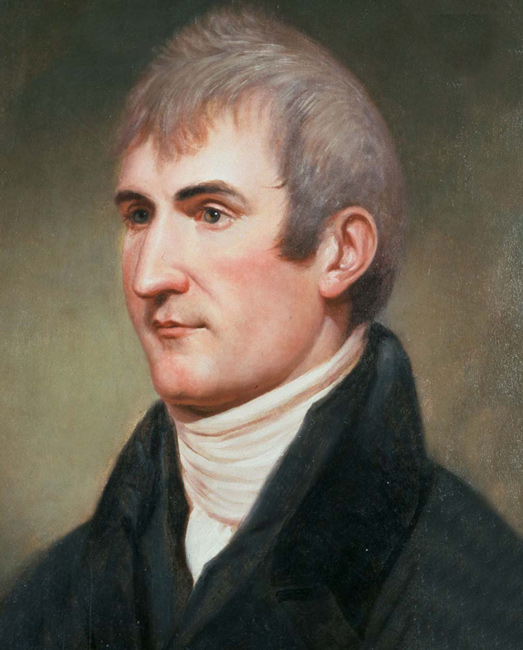Meriwether Lewis (1807)
Oil on canvas, original size, 23 x 18¾ inches. Independence National Historic Park
Charles Willson Peale (1741–1827), was famous not only as an artist but also as the curator of “Peale’s Museum” in Philadelphia, which contained his remarkable collection of natural history specimens as well as more than one hundred of his own portraits of famous people. He painted this likeness of Lewis in April of 1807.
Born on 18 August 1774, Meriwether Lewis literally grew up with the new republic. He was exactly eight months old when Paul Revere made the legendary ride that signalled the beginning of the War of Independence, and the birth of the new United States of America, which Lewis was to serve with distinction.
In January 1793, the American Philosophical Society of Philadelphia accepted the proposal of one of its leading members, Thomas Jefferson, to send an overland expedition in search of the Northwest Passage, the fabled all-water route to the Pacific Ocean. Eighteen-year-old Meriwether Lewis eagerly volunteered to lead it, but his offer was rejected on account of his youth and inexperience. That expedition was soon aborted anyway.
When Lewis was 20 years old he answered President George Washington’s plea for volunteers to quell the so-called Whiskey Rebellion of 1794. While on leave from the military in 1796, he was admitted to the Scribe of the Door to Virtue Lodge No. 44 of the Ancient Free and Accepted Masons in Albemarle County, Virginia, and received his masonic apron in January of 1797 (see Lewis as Master Mason).
By age 26 he had risen to the rank of captain in the First U.S. Infantry Regiment. Late in the winter of 1801, 27-year-old Lewis was summoned by Thomas Jefferson, the newly-elected third president of the United States, to serve as his personal secretary and aide.
Birth of the Expedition
On January of 1803, Congress appropriated $2,500 to mount an official military expedition to the Northwest, and President Jefferson named Lewis as its commander.
On 14 May 1804, the “corps of volunteers for North West Discovery,” as Captain Lewis titled the expeditionary force, embarked from its winter encampment across the Mississippi River from St. Louis, bound up the Missouri River toward the Pacific Ocean at the mouth of the Columbia River. Captain Lewis was three months shy of his 30th birthday.
After two years, four months, and ten days, the Corps of Discovery returned triumphantly to St. Louis on 23 September 1806. He was thirty-two years old.
Lewis Returns Home
Early in November, 1806, Meriwether Lewis set out from St. Louis, bound for Washington, D.C., with a stop en route for a visit with his mother. On 13 December 1806 he arrived at Locust Hill, the 2,000-acre family plantation in Albemarle County, Virginia, among the foothills of the Appalachian Mountains. In nearby Charlottesville on the 15th, about fifty of “the most respectable inhabitants of the country” gathered to welcome him home.[1]Donald Jackson, Letters of the Lewis and Clark Expedition with Related Documents, 1783–1854, 2nd ed., 2 vols. (Urbana: University of Illinois Press, 1978), 2:692-693.
A spokesman for the assembled citizens expressed their affection and congratulations, and welcomed him back “to civilized life.”
“The difficult and dangerous enterprize which you have so successfully atchieved,” the orator continued, “is pregnant with consequences.”
We indulge not in the delusions of hope, nor the visions of fancy; when we behold in this expedition . . . the germ of extended civilization, science and liberty: when we behold the federative system, and the principles of representative democracy extending their genial influence and receiving in their parental embrace, nations still in the infancy of reason and government; and regions yet groaning under unviolated forests.
Lewis responded with appropriate modesty, sharing credit for the expedition’s success with his “dear and interesting friend capt. Clark,” and to the rest of the Corps of Discovery. Finally, he reassured his friends:
With you I trust, that the discoveries we have made, will not long remain unimproved; and that the same sentiment which dictated to our government, an investigation into the resources so liberally bestowed by nature in this fair portion of the globe, will prompt them to avail themselves of those resources, to promote the cause of liberty and the honour of America, and then to relieve distressed humanity, in whatever shape she may present herself.
According to the local newspaper in which the speeches were reported, “the company then sat down to an excellent dinner: many appropriate toasts were given, the social song went round; and they passed the evening in that spirit of festivity and mirth, which the joyful occasion, and the presence of their friend, safely returned from his perilous expedition, and in the bloom of health, inspired.”
Lewis’s Final Journey
The following winter he was appointed governor of the Territory of Louisiana. While en route to Washington, D.C. Lewis died, probably by his own hand, at Grinder’s Stand on the Natchez Trace in Tennessee, in the early morning hours of 11 October 1809. He was forever thirty-five.
Notes
| ↑1 | Donald Jackson, Letters of the Lewis and Clark Expedition with Related Documents, 1783–1854, 2nd ed., 2 vols. (Urbana: University of Illinois Press, 1978), 2:692-693. |
|---|

